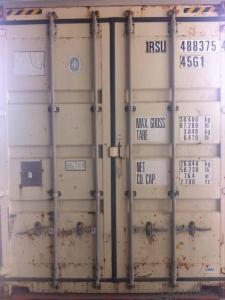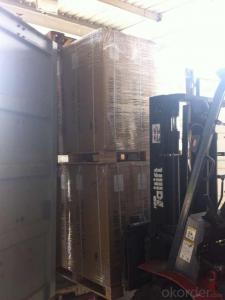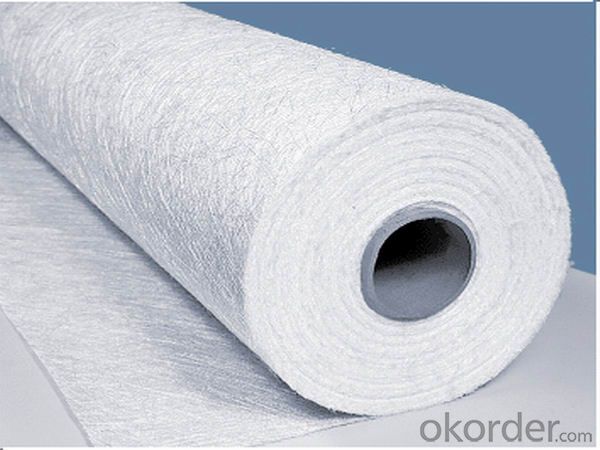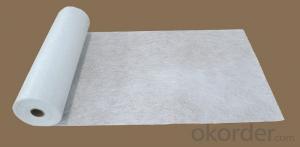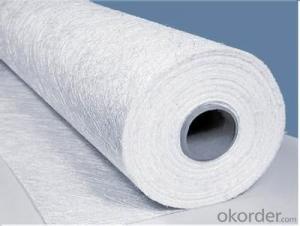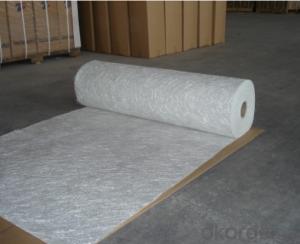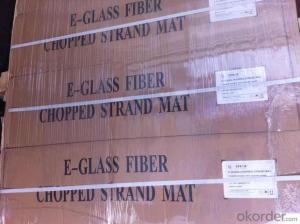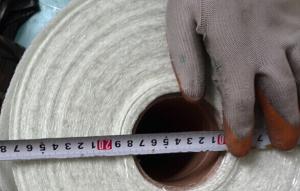Fiberglass Mat Tissue Chopped Strand Mat with Powder Binder
- Loading Port:
- Shanghai
- Payment Terms:
- TT OR LC
- Min Order Qty:
- 20000 kg
- Supply Capability:
- 200000 kg/month
OKorder Service Pledge
OKorder Financial Service
You Might Also Like
1.Brief Introductions
Fiberglass chopped strand mat with powder binder is made of randomly distributed chopped strands held together by a powder binder.
The roll width ranges from 50mm to 3300mm.
Additional demands on wet-out and decomposition time may be available upon request.
2.Product Features
Fast breakdown in styrene
High tensile strength, allowing for use in hand lay-up process to produce large-area parts
Good wet-through and fast wet-out in resins, rapid air lease
3.Product Specifications
Property | Area Weight | Moisture Content | Size Content | Breakage Strength | Width |
(%) | (%) | (%) | (N) | (mm) | |
Property | IS03374 | ISO3344 | ISO1887 | ISO3342 | |
EMC80P | ±7.5 | ≤0.20 | 8-12 | ≥40 | 50-3300 |
EMC100P | ≥40 | ||||
EMC120P | ≥50 | ||||
EMC150P | 4-8 | ≥50 | |||
EMC180P | ≥60 | ||||
EMC200P | ≥60 | ||||
EMC225P | ≥60 | ||||
EMC300P | 3-4 | ≥90 | |||
EMC450P | ≥120 | ||||
EMC600P | ≥150 | ||||
EMC900P | ≥200 |
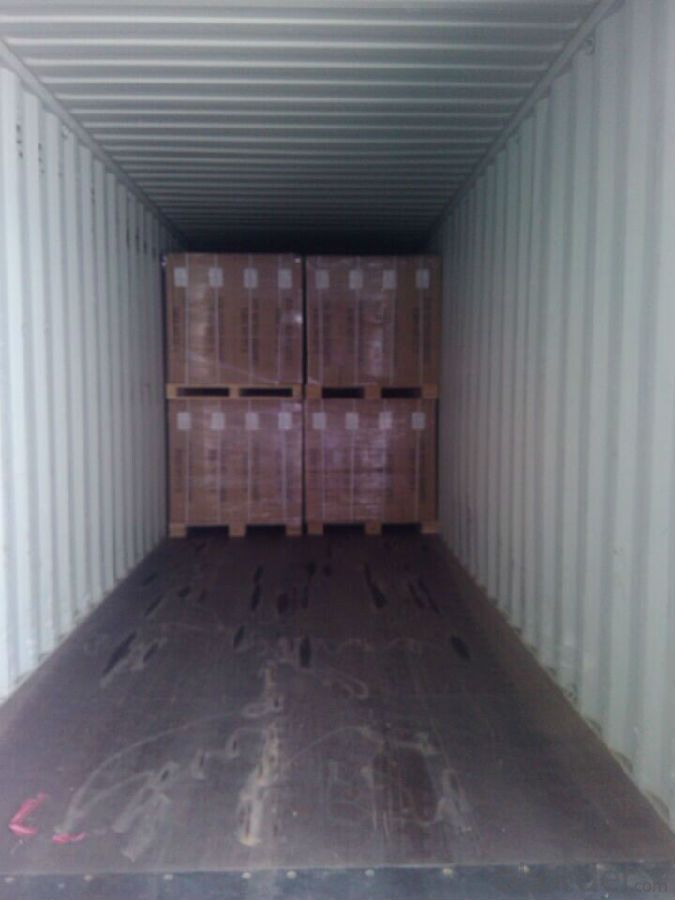
4.FAQ
Packaging:
Each Chopped Strand Mat is wound onto a paper tube which has an inside diameter of 76mm and the mat roll has a diameter of 275mm. The mat roll is wrapped up with plastic film,and then packed in a cardboard box or wrapped up with kraft paper. The rolls can be vertically or horizontally placed. For transportation, the rolls can be loaded into a cantainer directly or on pallets.
Delivery Time:
10-20 days after getting the down payment or original acceptable L/C.
- Q: Is fiberglass mat tissue suitable for wastewater treatment applications?
- Yes, fiberglass mat tissue is suitable for wastewater treatment applications. Fiberglass mat tissue is a material that is resistant to chemicals, corrosion, and degradation, making it an ideal choice for various industrial applications, including wastewater treatment. It can be used as a filtration media to separate solid particles from wastewater, as a lining material to prevent corrosion in tanks and pipes, and as a reinforcement material for concrete structures used in wastewater treatment plants. Additionally, fiberglass mat tissue has excellent mechanical strength, dimensional stability, and thermal resistance, which further enhance its suitability for wastewater treatment applications. Overall, fiberglass mat tissue is a reliable and effective material for use in wastewater treatment processes.
- Q: Can fiberglass mat tissue be used for HVAC ducting?
- HVAC ducting can indeed utilize fiberglass mat tissue. This lightweight substance is formed by bonding glass fibers with resin. Its exceptional thermal insulation qualities render it suitable for HVAC systems that prioritize temperature control. Moreover, fiberglass mat tissue boasts resistance against moisture and chemicals, assuring long-lasting durability in ducting applications. Its installation is hassle-free, and it can be tailored to fit varied duct sizes and shapes. All in all, fiberglass mat tissue emerges as a dependable and effective option for HVAC ducting.
- Q: What are the different surface finishes available for fiberglass mat tissue?
- There are several different surface finishes available for fiberglass mat tissue, each with its own unique properties and benefits. One common surface finish is a smooth or fine finish, which provides a smooth and even texture to the fiberglass mat tissue. This finish is often used when a high-quality surface appearance is desired, such as in cosmetic applications or when the fiberglass mat will be painted or coated. Another option is a textured or coarse finish, which adds texture and grip to the surface of the fiberglass mat tissue. This finish is often used in applications where increased friction or traction is required, such as in flooring or decking materials. A third option is a fire-retardant finish, which is designed to provide increased fire resistance to the fiberglass mat tissue. This finish is commonly used in applications where fire safety is a concern, such as in building materials or insulation. Additionally, there are finishes available that offer specific properties such as increased chemical resistance, UV resistance, or enhanced durability. These finishes are often used in applications where the fiberglass mat tissue will be exposed to harsh environmental conditions or chemicals. Overall, the choice of surface finish for fiberglass mat tissue will depend on the specific application and desired properties. By selecting the appropriate finish, manufacturers can ensure that the fiberglass mat tissue meets the required performance standards and delivers the desired performance characteristics.
- Q: Can fiberglass mat tissue be used for waterproofing?
- Yes, fiberglass mat tissue can be used for waterproofing. Fiberglass mat tissue is a thin, non-woven material that is made from fiberglass fibers. It is commonly used in construction and building applications to provide reinforcement and waterproofing properties. When applied with a waterproofing agent or resin, the fiberglass mat tissue can create a waterproof barrier that helps to prevent the passage of water or moisture. This makes it an effective choice for applications such as roofing, basement waterproofing, and bathroom or shower installations. The strength and durability of fiberglass mat tissue also make it resistant to cracking or tearing, ensuring long-lasting waterproofing protection.
- Q: What is the specific gravity of fiberglass mat tissue?
- The specific gravity of fiberglass mat tissue typically ranges between 1.5 and 2.0.
- Q: Can fiberglass mat tissue be used for insulating exterior walls?
- Yes, fiberglass mat tissue can be used for insulating exterior walls. It is a commonly used material for insulation due to its thermal resistance properties and ability to improve energy efficiency in buildings.
- Q: How is fiberglass mat tissue used in the production of water tanks?
- Fiberglass mat tissue, a type of non-woven fabric made from glass fibers, is commonly used in the production of water tanks due to its excellent strength, durability, and resistance to corrosion. Water tanks are typically made from fiberglass reinforced plastic (FRP), which is a composite material consisting of a polymer matrix reinforced with fiberglass. The fiberglass mat tissue plays a crucial role in this process as it serves as the reinforcement material. Firstly, the fiberglass mat tissue is cut into the desired shape and size to fit the mold of the water tank. It is then layered onto the mold, with the number of layers depending on the required strength and thickness of the tank. Once the fiberglass mat tissue is in place, a resin matrix is applied to impregnate and bind the fibers together. This resin can be polyester, vinyl ester, or epoxy, depending on the specific requirements of the water tank. The resin is typically applied using a spray or a roller, ensuring that it thoroughly saturates the fiberglass mat tissue. This process is often repeated multiple times to build up the necessary thickness and strength of the tank. After the resin has cured, the fiberglass mat tissue and resin composite becomes rigid and forms the structure of the water tank. The resulting FRP tank is lightweight, yet incredibly strong and durable, making it an ideal choice for storing and transporting water. The use of fiberglass mat tissue in water tank production provides several advantages. Firstly, it enhances the structural integrity of the tank, allowing it to withstand external forces such as pressure and impact. Secondly, fiberglass is highly resistant to corrosion, ensuring that the tank remains in good condition even when exposed to harsh environmental conditions or corrosive substances present in the water. Overall, fiberglass mat tissue is a critical component in the production of water tanks, providing strength, durability, and corrosion resistance, making it a reliable choice for various industrial, commercial, and residential applications.
- Q: Can fiberglass mat tissue be used for making electrical enclosures?
- No, fiberglass mat tissue cannot be used for making electrical enclosures. Electrical enclosures require materials that have high electrical insulation properties, such as non-conductive plastics or metals, to ensure safety and prevent electrical hazards.
- Q: How does fiberglass mat tissue perform in terms of dimensional stability?
- Fiberglass mat tissue performs exceptionally well in terms of dimensional stability. Its unique composition of fine fibers and binders helps it maintain its shape and structure even under significant stress or changes in temperature and humidity. This makes it ideal for applications where dimensional stability is crucial, such as in the construction of composite materials, automotive parts, and insulation products.
- Q: Can fiberglass mat tissue be used for wall insulation?
- No, fiberglass mat tissue is not typically used for wall insulation. It is more commonly used in applications such as reinforcing and adding strength to composite materials like fiberglass panels or laminates. For wall insulation, other materials like fiberglass batts, mineral wool, or foam boards are typically used.
Send your message to us
Fiberglass Mat Tissue Chopped Strand Mat with Powder Binder
- Loading Port:
- Shanghai
- Payment Terms:
- TT OR LC
- Min Order Qty:
- 20000 kg
- Supply Capability:
- 200000 kg/month
OKorder Service Pledge
OKorder Financial Service
Similar products
Hot products
Hot Searches
Related keywords

